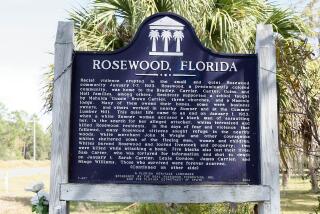Remembering George Wallace
- Share via
Unless great care is taken, history can become less an accurate chronicling of the times and more a sandpapering of the rough edges of reality. With the death Sunday of former Alabama Gov. George C. Wallace, it’s important that the former segregationist not simply become The Man Who Didn’t Mean It.
Any honest accounting of the tumultuous ‘60s and Wallace’s role in the issue of equal rights for African Americans will dwell less on his tortured rationalizations and those of other revisionists. It must include the words of Wallace’s inaugural address (written by a Ku Klux Klansman) for his first term as governor in which he promised to protect Alabama’s “Anglo-Saxon people” from “communistic amalgamation” with blacks and angrily declared, “Segregation today, segregation tomorrow, segregation forever.”
It will include Wallace’s standing in the schoolhouse door to bar blacks from the then-all-white University of Alabama. It will include his order to close Birmingham schools that were slated for desegregation, and his attempted use of Alabama National Guard troops to enforce his edict. It will include the order to send state troopers up against a peaceful voting rights march on the state capitol and the result: bludgeoned and bloody marchers.
Wallace later claimed that the federal government was his real target. “It’s very unfortunate that it involved race when we raised those issues,” Wallace actually claimed once. “I was never saying anything that reflected on black people, and I’m sorry it was taken that way.” Wallace recanted his segregationist past and, ironically, in later years actively sought out the black vote he had worked so hard to suppress.
Alabama was a state in which bombings and other forms of violence against blacks and others seeking civil rights were almost a matter of routine. Wallace, as the state’s ranking elected official, set the leadership tone. His virulent speeches served as fighting words for those who only had to look to the governor’s mansion for a sign of just how far they could go to keep black Alabama in its place.
In his later years, Wallace attempted to make peace with himself and others. But that effort doesn’t erase a sorry history whose legacy remains with the nation today.
More to Read
Sign up for Essential California
The most important California stories and recommendations in your inbox every morning.
You may occasionally receive promotional content from the Los Angeles Times.













